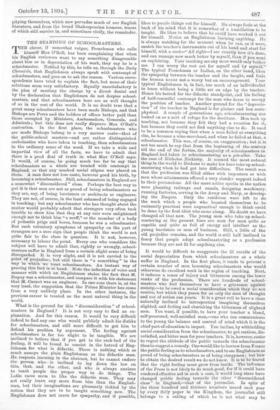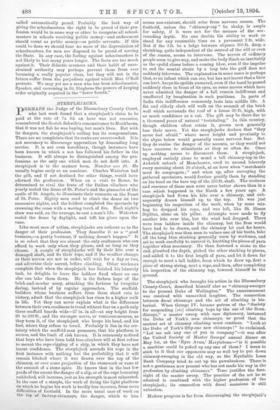THE STANDING OF SCHOOLMASTERS.
THE clever, if somewhat vulgar, Frenchman who calls himself Max O'Rell, has been complaining that when his English reviewers want to say something disagreeable about him or in depreciation of his work, they say he is a schoolmaster. Nettled by this, he tells us, through the Daily Chronicle, that Englishmen always speak with contempt of schoolmasters, and goes on to ask the reason. Various corre- spondents have tried to explain the fact, but none of their solutions seem very satisfactory. Equally unsatisfactory is the plan of meeting the charge by a direct denial and by the declaration that Englishmen do not despise school- masters, and that schoolmasters here are as well thought of as in the rest of the world. It is no doubt true that a great many schoolmasters have been made Bishops, and that Bishops are Peers and the holders of offices better paid than those occupied by Ministers, Ambassadors, Generals, and Admirals ; but this does not really disprove Max O'Rell's contention. In the first place, the schoolmasters who are made Bishops belong to a very narrow caste—that of the public-school masters—and are rather distinguished ecclesiastics who have taken to teaching, than schoolmasters in the ordinary sense of the word. If we take a wide and impartial view of all the facts, we have to admit that there is a good deal of truth in what Max O'Rell says. It would, of course, be going much too far to say that schoolmasters as a whole are treated with contempt in England, or that any marked social stigma was placed on them. A man does not lose caste, however good his birth, by becoming a schoolmaster. Still, schoolmasters in England are a somewhat " disconsidered" class. Perhaps the best way to put it is that men are not as proud of being schoolmasters as they are, say, of being barristers or architects or engineers. They are not, of course, in the least ashamed of being engaged in teaching ; but any schoolmaster who has thought about the matter would probably admit that strangers very often took trouble to show him that they at any rate were enlightened enough not to think him "a muff," or the member of a body of pedantic prigs and bores, because he was a schoolmaster. But such voluntary symptoms of sympathy on the part of strangers are a sure sign that people think the world is not quite fair to the class in question. It is not, however, necessary to labour the point. Every one who considers the subject will have to admit that, rightly or wrongly, school- masters suffer in England from a certain slight sense of being disregarded. It is very slight, and it is not carried to the point of prejudice ; but still there is "a something" in the way in which we treat schoolmasters. An instant way of
proving this fact is at hand. Note the inflection of voice and manner with which an Englishman states the fact that M. Dupuy was a schoolmaster, and compare it with his statement that M. Carnot was an engineer. In one case there is, at the very least, the suggestion that the Prime Minister has come from a very unlikely place. In the other instance, the previous career is treated as the most natural thing in the world.
What is the ground for this " disconsideration " of school- masters in England ? It is not very easy to find an ex- planation. And for this reason. It would be very difficult indeed to find any one who would publicly admit his dislike for schoolmasters, and still more difficult to get him to defend his position by argument. The feeling against schoolmasters is far too slight to be tangible. We are inclined to believe that if you get to the rock-bed of the feeling, it will be found to consist in the hatred of Eng- lishmen for what is didactic. There is nothing which so much annoys the plain Englishman as the didactic man. He respects learning in the abstract, but he cannot endure the person who is inclined to lay down the law on this, that, and the other, and who is always anxious to teach people the proper way to do things. The Latin races seem to like the didactic man. They may not really learn any more from him than the English- man, but their imaginations are pleasantly tickled by the notion that they are to be taught something new. The Englishman does not crave for sympathy, and if possible, likes to puzzle things out for himself. He always feels at the back of his mind that it is somewhat of a humiliation to be taught. He likes to believe that he could have worked it out for himself. Notice an Englishman learning anything. He is always watching for the moment when he can, as it were, snatch the teacher's instruments out of his hand and start for himself, with a curt—" All right—I see exactly how it's done, and can manage now much better by myself, than if you went on explaining. Your teaching me any more would only bother me. I can worry the rest out for myself and by myself." The typical Frenchman or Italian, on the other hand, likes the sympathy between the teacher and the taught, and feels the human nexus not a worry but an encouragement. Your typical Englishman is, in fact, too much of an individualist to learn without being a little set on edge by the teacher. Hence his hatred for the didactic standpoint, and his feeling of half-resentful contempt for the man who dares to occupy the position of teacher. Another ground for the " deprecia- tion" of the teacher in England is far plainer and less meta- physical. A couple of generations ago, schoolmastering was looked on as a sort of refuge for the destitute. Men took up teaching, not because they felt they had a vocation for it, but because they could not find anything else to do. It used to be a common saying that when a man failed at everything else, he became a wine-merchant, and when he failed at that, a schoolmaster. This was, of course, an exaggeration ; but it is not too much to say that from the beginning of the century till the end of the forties, the majority of schoolmasters in England had taken to schoolmastering as a pie-alley. Take the case of Nicholas Nickleby. It seemed the most natural thing in the world to Dickens to make his hero take up school- mastering when he had got into difficulties. The result was that the profession was filled either with impostors or with men whose attainments offered a very slender support indeed to their pretensions. All the more active spirits in the nation were planning railways and canals, designing machinery, running factories, serving in the Army and Navy, or develop- ing the Empire. Only the residuum were left to do the work which a people who boasted themselves to be eminently practical were unpractical enough to think could be done by the first idiot who came along. No doubt we have changed all that now. The young men who take up school- mastering at the present time are man for man quite as capable and quite as full of energy and intellect as the young barristers or men of business. Still, a little of the old prejudice remains, and the world is still half inclined to fancy that people adopt schoolmastering as a profession because they are not fit for anything else.
It would be difficult to exaggerate the ill results of the social depreciation from which schoolmasters as a whole suffer in England. In the first place, it tends to prevent a certain number of men becoming schoolmasters who would otherwise do excellent work in the region of teaching. Next, it induces a sense of injury and bitterness among the lower ranks of the profession. There are hundreds of school- masters who feel themselves to have a grievance against society,—to be owed a social consideration which they do not receive, but which they yearn for as only the man of thought and not of action can yearn. It is a great evil to have a class naturally inclined to introspection imagining themselves slighted, and feeling and cherishing the bitterness of slighted men. You want, if possible, to have your teacher a bland, self-possessed, well-satisfied man,—one who can communicate to the young the balance and control of mind which it is the chief part of education to impart. You incline, by withholding social consideration from the schoolmaster, to get restless, dis- satisfied, and bitter men for your teachers. It is, however, easier to regret the attitude of the public towards the schoolmaster than to suggest a remedy. One would like to borrow from France the public feeling as to schoolmasters, and to see Englishmen as proud of being schoolmasters as of being clergymen ; but how to obtain the desired result we do not know. It is to be feared that the right feeling must grow from inside. The influence of the Press is not likely to do much good, for if it could have rendered effective aid in such a case, it would long since have changed public feeling towards the other " disconsidered class" in England,—that of the journalist. In spite of the three hundred and thirteen numbers issued each year by every daily paper in the Kingdom, the journalist still belongs to a calling of which he is not what may be called automatically proud. Probably the best way of giving the schoolmasters the right to be proud of their pro- fession would be in some way or other to recognise all school- masters in schools receiving public money—and endowment should count as public money—as public servants. If this could be done we should hear no more of the depreciation of schoolmasters, for men are disposed to be proud of serving the State. In any case, the feeling against schoolmasters is not likely to last many years longer. The facts are too much against it. Their didactic manners and their habit of unre- strained authority may perhaps prevent them from ever becoming a really popular class, but they will not in the future suffer from the prejudices against which Max O'Rell protests. We may yet see a man who has been schoolmaster, Speaker, and exercising in St. Stephens the powers of keeping order originally acquired in. the "lower fourth."



















































 Previous page
Previous page